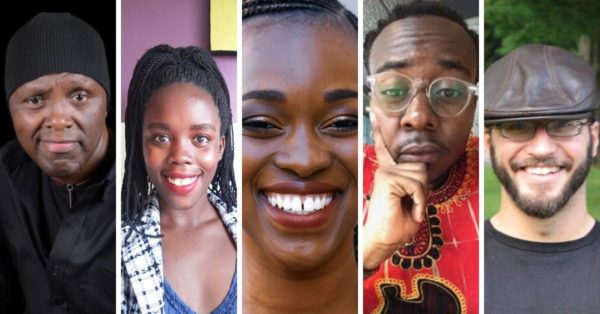
The 5 Shortlists for The 2019 Brittle Paper Awards were announced in November. Begun in 2017 to mark our seventh anniversary, the Awards aim to recognize the finest, original pieces of writing by Africans published online.
READ: The 2017 Brittle Paper Anniversary Award: Meet the Nominees
READ: The 2018 Brittle Paper Anniversary Award: Meet the 8 Finalists
The $1,100 prize money is split across five categories: The Brittle Paper Award for Fiction ($200), The Brittle Paper Award for Poetry ($200), The Brittle Paper Award for Creative Nonfiction ($200), The Brittle Paper Award for Essays & Think Pieces ($200), and The Brittle Paper Anniversary Award ($300), for writing published on our site. The winners will be announced on or after Tuesday, 10 December 2019.
MEET THE 6 FINALISTS FOR THE 2019 BRITTLE PAPER ANNIVERSARY AWARD

NKATEKO MASINGA (South Africa), for “Language, Trauma, & Identity Politics in Contemporary African Poetry,” a Conversation with Cheswayo Mphanza (Zambia)
Nkateko Masinga is a South African writer, publisher, spoken word artist, TEDx speaker, World Economic Forum Global Shaper in the Tshwane Hub, 2018 Mandela Washington Fellow, 2019 Ebedi Fellow, and PEN South Africa professional member. She is the founder and managing director of NSUKU Publishing Consultancy. Nkateko was nominated for a Pushcart Prize in 2018 and her work has received support from Pro Helvetia Johannesburg and the Swiss Arts Council. Her written work has appeared in Brittle Paper, Kalahari Review, Illuminations, Pyramid Editions, the University of Edinburgh’s Dangerous Women Project, and elsewhere. She is the Interviewer for Poetry at Africa in Dialogue, an online interview magazine that archives creative and critical insights with Africa’s leading storytellers. Her latest work has been selected by the African Poetry Book Fund, in collaboration with Akashic Books, for the 2020 New-Generation African Poets chapbook box set.
FROM “Language, Trauma, & Identity Politics in Contemporary African Poetry”:
In “Prodigal Son”, you juxtapose the story of Diouana in La noire de… and Sili in La petite Vendeuse de Soleil with your own experiences as a Zambian in America. Is there a part of you that imagines what your life would have been like had you never left Zambia? Is that what you see in Sili and Diouana, a comparison of the fate of the native and immigrant? If one must suffer, is it better to suffer at home or far from home?
I wrote “Genesis” as an exploration of what you aptly called “reconstruction of the fragmented”. Does the brokenness of a mentally ill person make them unworthy of having access to certain spaces in the way that “normal” people do? Can I claim a space that society has reserved for the sane, for those able to give consent to what is done to and with their bodies? I think it was a time when I was thinking a lot about reclaiming spaces. As a mentally ill person, stepping into that space not as a patient but as a doctor-in-training, I felt a sense of victory over my own suffering.
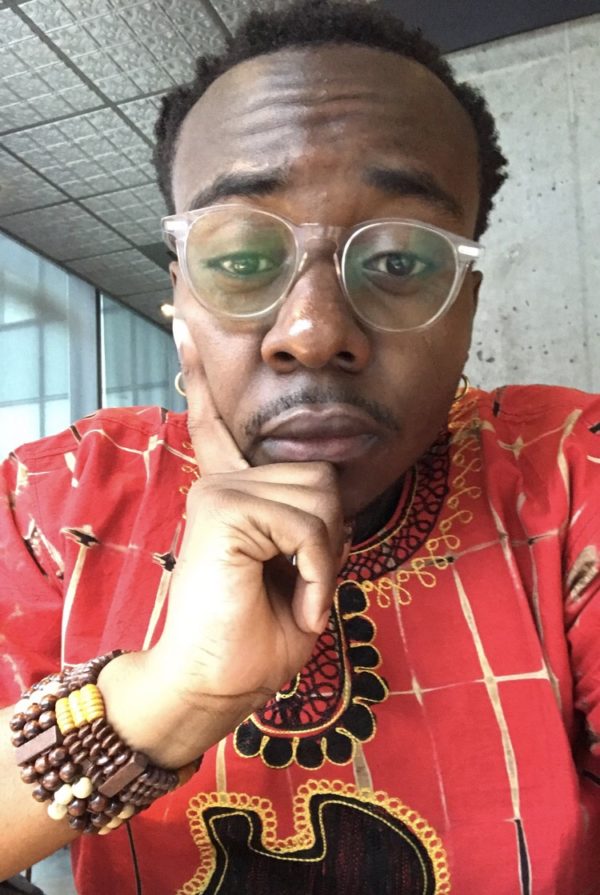
CHESWAYO MPHANZA (Zambia), for “Language, Trauma, & Identity Politics in Contemporary African Poetry,” a Conversation with Nkateko Masinga (South Africa)
Cheswayo Mphanza was born in Lusaka, Zambia and raised in Chicago, Illinois. His work has been featured in or is forthcoming from The New England Review, New Orleans Review, American Literary Review, Hayden’s Ferry Review, Vinyl, Prairie Schooner, RHINO, and elsewhere. He has received fellowships from the Bread Loaf Writers Conference, Callaloo, Columbia University, and Cave Canem. A finalist for the Brunel International African Poetry Prize and a recipient of the 2017 Hurston/Wright Award for College Writers, he earned his MFA from Rutgers-Newark.
FROM “Language, Trauma, & Identity Politics in Contemporary African Poetry”:
That is a great question about the loss of language. Language is really accessibility. It hinges upon so many possibilities. I am in that weird space of being able to somewhat understand my native language and verbalize a few words, but to be at length is a different story. I would not say that it is fear as to why I have not returned. It is a long story of immigration policies, understanding family in all its aspects, and whether once an immigrant becomes a citizen of his/her country how much of themselves do they see in their previous country? I want to return to Zambia for sure, but there are so many socio-politics surrounding my return that returning would not necessarily mean the same for me as it would mean to most people who make their way back home every now and then. The return would be more or less governed by this desire to fully grasp a part of my early self that was severed from Zambia. A part of me that wants to understand the country more in its history, politics, and economics.
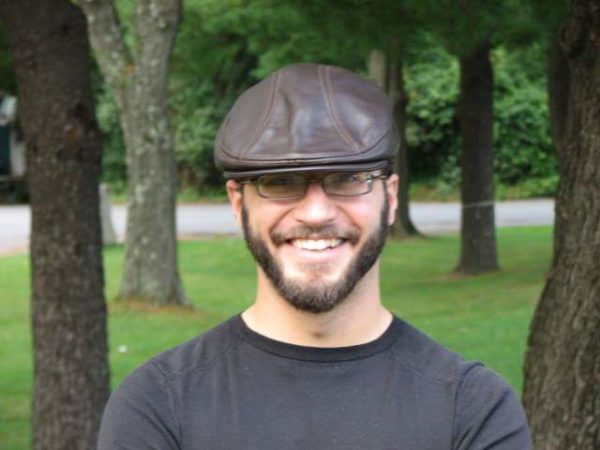
D. S. BATTISTOLI (USA), for “Negritude Is Omnipresent in African Writing: On Its Birth, Rebellion, & Disappearance,” ESSAY
D. S. Battistoli is an American-born worker in the field of international development who studied literature at university. At various points in his career, he has been based in Burkina Faso, Haiti, Liberia, Mali, and Senegal. Since 2016, he has called Abenasitonu, Suriname home.
FROM “Negritude Is Omnipresent in African Writing: On Its Birth, Rebellion, & Disappearance”:
On the one hand, it would seem to make no sense: if there was room for Richard Wright in Nardal’s salons, and for Fanon at Presence Africaine, there was certainly room for Soyinka in the Negritude movement. But his statement wasn’t really about protesting a lack of conceptual space. It was about announcing the young generation of African-born Anglophone writers as a leading force to be reckoned with, a force to be associated with independence and fierceness. It’s worth noting that his statement didn’t seem to have made much of a splash in 1962; it was only as his own significant literary talent became apparent as a result of his impressively growing body of work that his tigritude quote began to achieve a measure of fame.
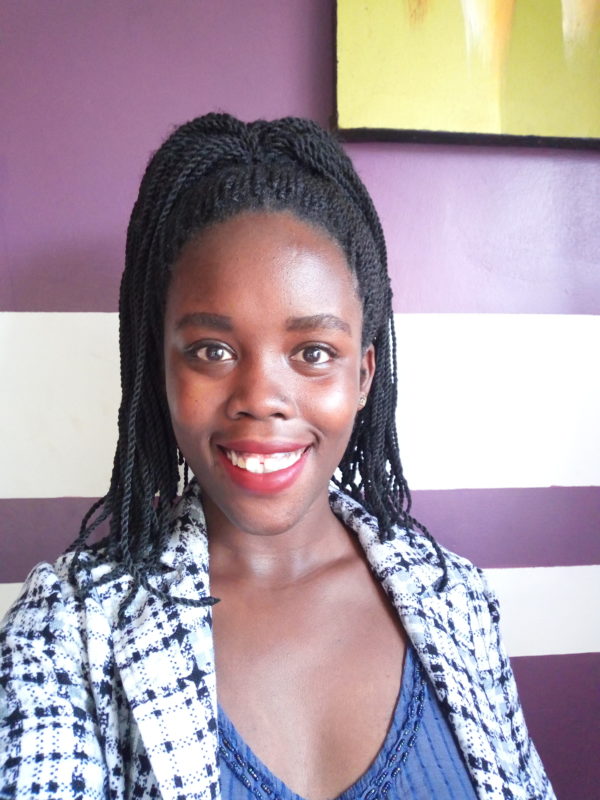
ACAN INNOCENT IMMACULATE (Uganda), for “Songbird,” FICTION, in Go the Way Your Blood Beats: Short Fiction from Africa
Acan Innocent Immaculate is a Ugandan writer and doctor. She won the Writivism Short Story Prize in 2016, and has been published by AFREADA, Omenana, Brittle Paper, LéO Africa Review, New Contrast, and in Selves: An Afro Anthology of Creative Nonfiction. Her most recent solo project is a children’s book titled The Pearl Trotters in Black, Yellow, Red. She has contributed to two anthologies: Go the Way Your Blood Beats: Short Fiction from Africa and the Writivism anthology Unbreakable Bonds.
FROM “Songbird”:
“From the time I was born, I always belonged to someone.” Zouks wonders if Kam understands that she doesn’t mean the loose-leashed belonging that allows you to breathe and wander, that she means that she has always been someone’s most prized possession, to be watched and kept close, always. “First, it was my mother. I don’t resent her for it. I was mute for seven years, and her love was my only shield against the world’s cruelty. Then it was my family. I was like this songbird they brought out from a cage to impress the guests. I could’ve borne that. Maybe I even enjoyed it. But then Adam. Adam loved me. It was oppressive, the way he loved me. He did it so completely it scared me. I was just a kid, and I was his whole world. Imagine how heavy that felt.”
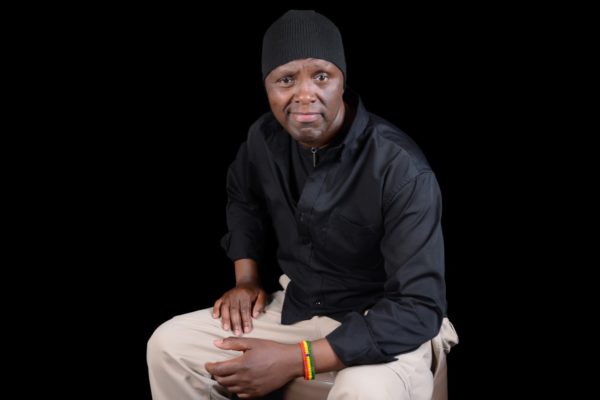
TEE NGUGI (Kenya), for “Who Is More Left Than the Other?,” ESSAY
Tee Ngugi is a columnist, writer, and singer-songwriter. His short fiction, essays, and articles have appeared in several publications, including New Orleans Review, St. Petersburg Review, Timbuktu, New Black Magazine, Kwani, Jahazi, and The East African, among others. His collection of short stories, Seasons of Love and Despair, was published in 2015 by East African Educational Publishers. A graduate of Yale, Tee has worked in the academic and NGO sectors in Zimbabwe, Namibia, and Kenya. He is interested in the tension between culture and development, and identity, and how societies reinvent themselves while maintaining the illusion of continuity. He lives in Nairobi, Kenya.
FROM “Who Is More Left Than the Other?”:
Leftists, especially those based in the West, not only shy away from criticizing governments from the so-called Global South, they also instruct those of us who reside here, victims of and witnesses to larceny on an epic scale, not to do so. Doing so, the lecture goes, plays into the evil designs of Western imperialism. Those were the exact words an editor of a London-based magazine told a gathering of African journalists in Namibia. The absence of even a little sense of irony was bewildering. Here was a man who had escaped Jerry Rawling’s tyrannical regime now lecturing journalists that criticism of their governments was feeding into the false narrative of an incompetent Africa of dictators, corruption and gross human rights abuses. In similar fashion, Bhutto warns writers from the Global South not to fall into the imperialist trap of denouncing their governments: “Writers from the global south have long been burdened with the expectation that they respond to every terrorist atrocity in their countries, and denounce their governments and large numbers of their fellow citizens. They can only be amazed at how quickly even left-leaning writers in the west defer to brute authority and rush to place a human face over it.” One can be forgiven for thinking that the Left is only interested in waging a nationalist ideological war against the West in which the real conditions of the people in the Global South are just incidental. As proof of this, compare their approach to Dr Denis Mukwege’s 2018 Nobel Peace Prize acceptance speech. The Left uses ideological formulas to explain issues; Dr Mukwege called for specific actions to eliminate rape as a weapon of war.
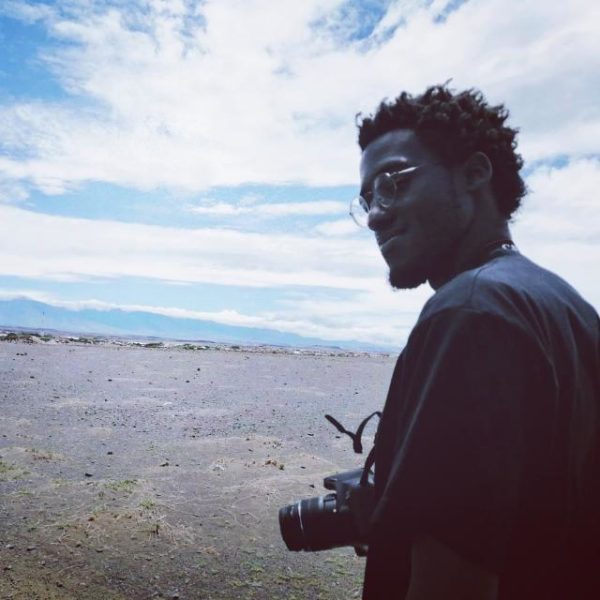
CAREY BARAKA (Kenya), for “The Kenyan Literary Hustle,” ESSAY
Carey Baraka is a writer from Kisumu, Kenya. He sings for a secret choir in Nairobi.
FROM “The Kenyan Literary Hustle”:
Half a century after the Nairobi Revolution, in Nairobi, Kwani? was born. Kwani?: a group concerned with literary production, but also a collective of different individuals concerned with their own individual cultural careers. The Reddykullas Generation. 2002 meshing into ‘03, and Kenyans had been declared, by a Gallup poll, the most optimistic people in the world. Yote yawezekana bila Moi! Parselelo Kantai, writing about this Reddykullas Generation, a generation whose central experience was survival, would declare that “a new Kenya was developing from the margins,” that the project of renewal was being replicated everywhere, that Kwani? had sparked a literary renaissance in the country. Binya had just come back, Caine Prize in tow, and a literary culture was being established. Exciting times were nigh. The Kenyans were writing again, writing in visibility, emboldened by the optimism of the end of the Moi regime. Binya had won the Caine Prize, and Voni would win it the next year, and Parsa would be on the shortlist the year after Voni’s win, denied a win only by, depending on who you believe, literary geopolitics that meant that Kenyans couldn’t win the prize three years in a row. The Reddykullas Generation was doing it. The thing was being done.
Enquiries, about the shortlisted writers or for interviews with them, can be sent to [email protected].









COMMENTS -
Reader Interactions